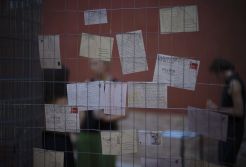In conversation with Santiago Sierra
11 February 2022
Dr Gulsen Bal and Dr Michael Pinchbeck in conversation with Santiago Sierra about his artistic practice and the role of critical practice today
This conversation explores Santiago Sierra’ artistic practice part of Bunker Talks’ series hosted by Dr Gulsen Bal (Senior Lecturer and Programme Leader in MA/MFA Contemporary Curating) and Dr Michael Pinchbeck (Reader in Theatre at Manchester School of Art and Senior Research Lead for Art & Performance Research Hub).

Santiago Sierra graduated in Fine Arts at Madrid’s Complutense University and completed his artistic studies in Hamburg, where he studied under professors F. E. Walter, S. Brown and B. J. Blume. His beginnings are linked to alternative art circuits in the capital of Spain—El Ojo Atómico, Espacio P—although he would go on to develop much of his career in Mexico (1995–2006) and Italy (2006–10). His work has always exerted a great influence on artistic literature and criticism.
Sierra’s oeuvre strives to reveal the perverse networks of power that inspire the alienation and exploitation of workers, the injustice of labour relations, the unequal distribution of wealth produced by capitalism, the deviance of work and money, and racial discrimination in a world scored with unidirectional (south-north) migratory flows.
Revisiting and refiguring certain strategies characterising the Minimalist, Conceptual and Performance Art of the 1960s and 70s, Sierra interrupts flows of capital and goods (Obstruction of Freeway With a Truck’s Trailer, 1998; Person Obstructing a Line of Containers, 2009); he hires labourers to reveal their precarious circumstances (20 Workers in a Ship’s Hold, 2001); he explores the mechanisms of racial segregation derived from economic inequalities (Hiring and Arrangement of 30 Workers in Relation to Their Skin Color, 2002; Economical Study of The Skin of Caracans, 2006); and refutes the stories that legitimate a democracy based on state violence (Veterans of the Wars of Cambodia, Rwanda, Kosovo, Afghanistan and Iraq Facing the Corner, 2010–2; Los encargados, 2012).



